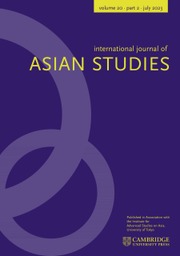Article contents
MODERN EUROPE AND THE CREATION OF THE “ISLAMIC WORLD”
Published online by Cambridge University Press: 26 June 2007
Abstract
This article attempts to demonstrate that the notion of “Islamic world” was a creation of the modern age, emanating from north-western Europe in the nineteenth century. The term incorporates two opposing ideological meanings: on the one hand, Europe representing modern, positive values is set against the Islamic world, representing pre-modern, minus values, while on the other hand, the Islamic world was the common bond among all Muslims for their solidarity and unification against European colonialism. The article goes on to investigate why, how and when precisely the two concepts of “Islamic world” were created under the influence of modern European thought. It is stressed that in much of today's discourse too we can still perceive the two different meanings of the term, and this has often led to confusion and misunderstanding in discussion. Modern historians have played a role in substantiating the ideology of the “Islamic world”, because modern historiography has often described political objectives as actual reality.
- Type
- Asian perspectives
- Information
- Copyright
- Copyright © Cambridge University Press 2007
- 2
- Cited by


